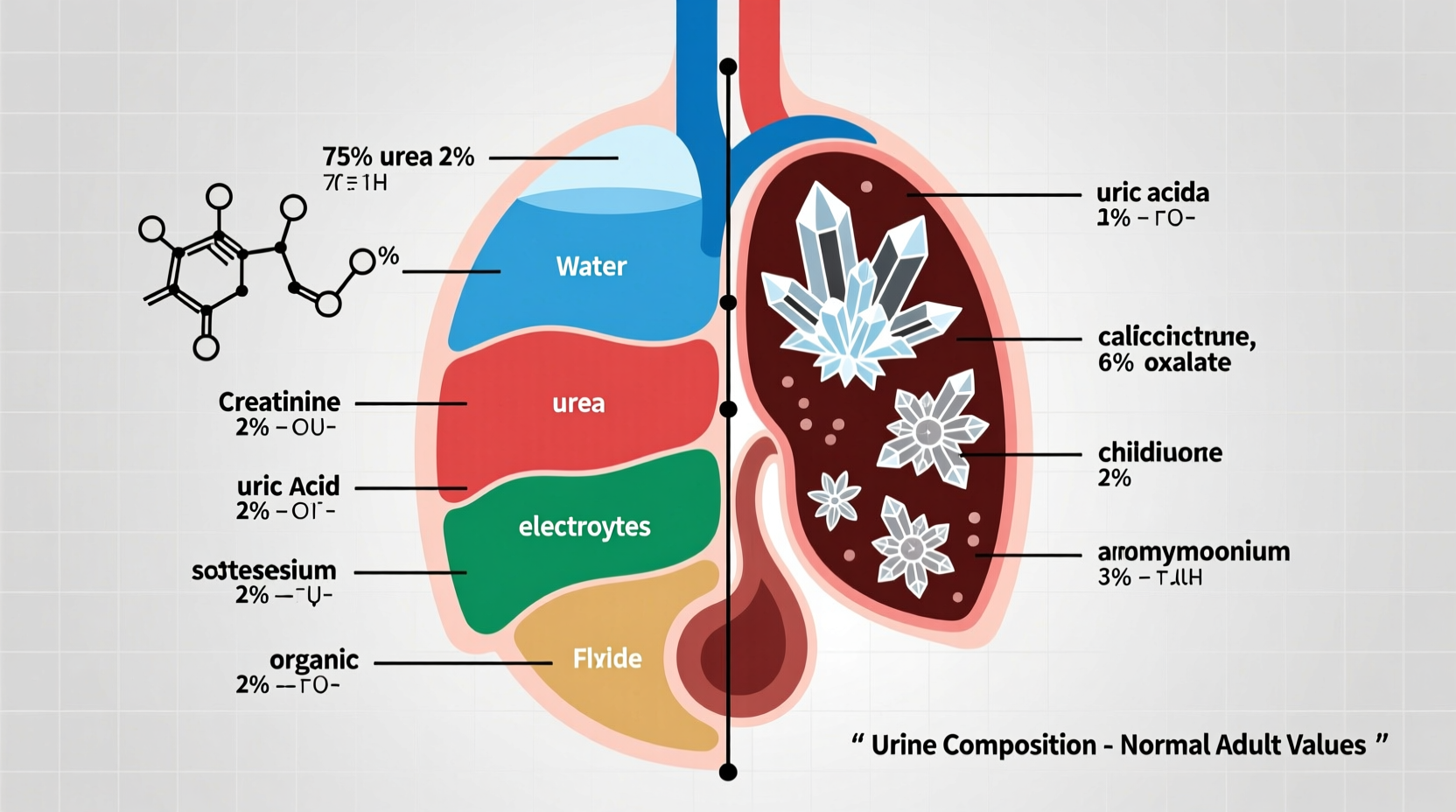The short, medically accurate answer: Human urine is not meant for consumption and typically has a bitter, salty taste due to its composition of water, urea, salts, and waste products. Consuming urine poses health risks and is not recommended under any circumstances. This article provides factual information about urine composition for educational purposes only, with guidance from medical authorities on when urine characteristics may indicate health concerns.
Understanding Urine Composition and Characteristics
Urine serves as your body's waste elimination system, filtering toxins and excess substances from your bloodstream. According to the National Institute of Diabetes and Digestive and Kidney Diseases, healthy urine contains approximately:
| Component | Percentage | Role in Taste Profile |
|---|---|---|
| Water | 95% | Neutral base |
| Urea | 2.5% | Bitter, ammonia-like flavor |
| Sodium Chloride | 1.5% | Salty taste |
| Other compounds | 1% | Bitter, metallic notes |
Medical professionals historically assessed urine characteristics through a practice called uroscopy, which included visual inspection and occasionally taste testing to diagnose conditions. However, modern medicine has completely replaced these methods with laboratory analysis. The Centers for Disease Control and Prevention confirms that urine analysis today requires proper medical testing equipment, not sensory evaluation.

Why Urine Taste Should Concern You (Medically)
While you should never taste urine, certain characteristics that might affect taste can indicate health issues requiring professional evaluation:
When Changes Signal Medical Conditions
- Excessively sweet taste - Historically associated with diabetes (the term "diabetes mellitus" means "honey-sweet")
- Strong ammonia odor - May indicate urinary tract infection or dehydration
- Bitter metallic taste - Could signal liver problems or certain medications
- Cloudy appearance - Often indicates infection or kidney issues
The Mayo Clinic emphasizes that these characteristics should be evaluated through proper medical testing, not personal sensory assessment. Self-diagnosis based on urine characteristics can lead to dangerous misinterpretations and delayed treatment.
Significant Health Risks of Urine Consumption
Despite historical practices or misinformation circulating online, consuming urine carries serious health risks:
Documented Medical Concerns
- Reintroduction of waste products - Your kidneys filter these substances for a reason
- Electrolyte imbalance - Particularly dangerous for those with kidney conditions
- Concentration of medications - Can create toxic levels when re-ingested
- Bacterial exposure - Urine isn't sterile as commonly believed
The U.S. Food and Drug Administration explicitly warns against urine therapy, stating: "There is no scientific evidence supporting health benefits from drinking urine, and significant risks exist from reintroducing waste products into your system."
When to Consult a Medical Professional
Instead of attempting to assess urine through taste, watch for these signs that warrant professional medical evaluation:
- Persistent changes in urine color lasting more than 48 hours
- Pain or burning during urination
- Frequent urination with small volumes
- Unusual odor that doesn't correlate with diet
- Blood visible in urine
Your healthcare provider can order proper urinalysis tests that examine pH levels, specific gravity, protein content, glucose levels, and other markers far more accurately than sensory evaluation ever could. The American Urological Association recommends professional testing for any persistent concerns about urinary health.
Safe Alternatives for Health Monitoring
If you're concerned about your health indicators, these evidence-based approaches are medically recommended:
- Regular check-ups - Annual physicals with urine testing
- Hydration monitoring - Pale yellow urine indicates proper hydration
- Diet tracking - Certain foods temporarily affect urine color
- Professional testing - For any persistent concerns
Remember that your body provides many other indicators of health that don't require risky assessment methods. Pay attention to energy levels, digestion, sleep quality, and other holistic markers while consulting healthcare professionals for proper evaluation.
Frequently Asked Questions
Is it ever safe to taste urine for medical reasons?
No, modern medicine strongly advises against tasting urine under any circumstances. Professional urinalysis uses laboratory testing that's far more accurate and doesn't expose you to potential pathogens or waste products. The American Medical Association confirms there are no medically approved situations where urine tasting provides valuable diagnostic information.
Can urine taste indicate diabetes?
Historically, sweet-tasting urine was associated with diabetes (the term "mellitus" means honey-sweet), but this method of detection is obsolete and dangerous. Modern glucose testing provides accurate, safe diabetes screening. Never attempt to diagnose medical conditions through urine taste, as this can lead to dangerous misinterpretations and delayed treatment.
What causes unusual urine taste in medical conditions?
Certain medical conditions can alter urine composition: diabetes may cause sweet-smelling urine due to glucose, liver conditions might produce darker, stronger-smelling urine, and urinary tract infections often create cloudy urine with a strong odor. However, these characteristics should be evaluated through professional medical testing, not personal sensory assessment.
Are there documented health risks from drinking urine?
Yes, documented risks include electrolyte imbalances, reintroduction of waste products into your system, potential exposure to bacteria, and concentration of medications to toxic levels. The U.S. Food and Drug Administration explicitly warns against urine therapy, stating there's no scientific evidence of benefits and significant health risks exist from consuming urine.
How do medical professionals properly analyze urine?
Medical professionals use laboratory urinalysis that examines multiple factors including pH, specific gravity, protein levels, glucose content, ketones, bilirubin, and microscopic examination for cells or crystals. This comprehensive analysis provides accurate diagnostic information without the health risks associated with sensory evaluation. Your healthcare provider can order appropriate testing if you have concerns about your urinary health.











 浙公网安备
33010002000092号
浙公网安备
33010002000092号 浙B2-20120091-4
浙B2-20120091-4